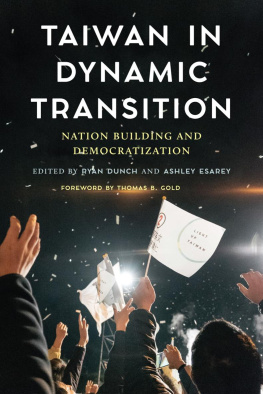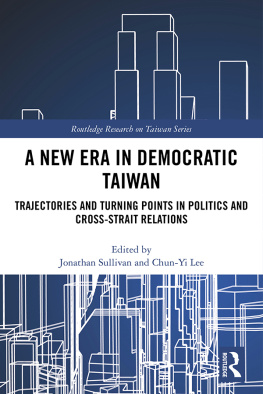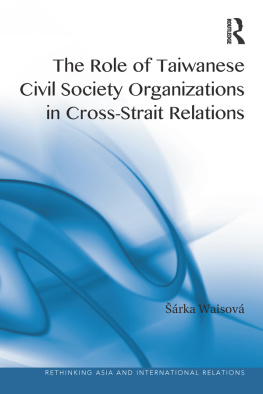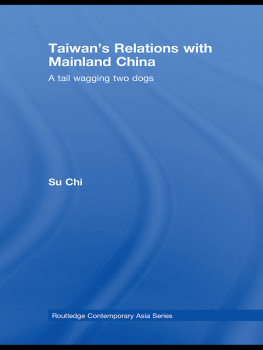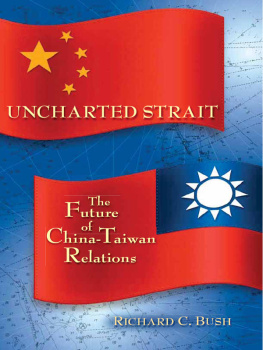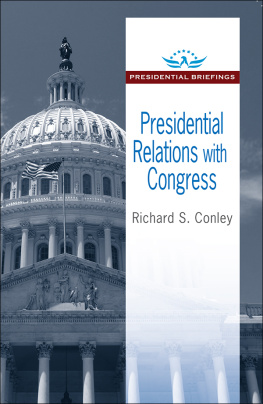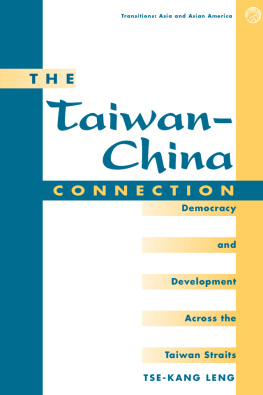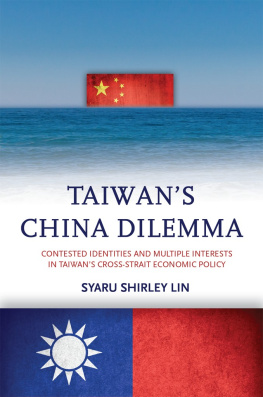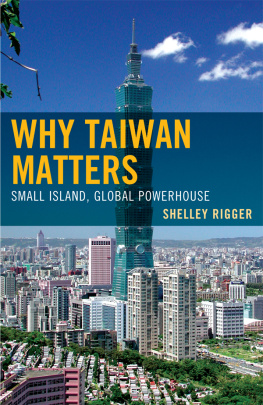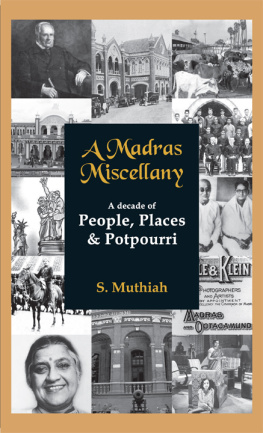Taiwans Presidential Politics
Published in cooperation with the
East-West Center
TAIWAN IN THE MODERN WORLD
CONSTITUTIONAL REFORM AND THE FUTURE OF THE REPUBLIC OF CHINA
Edited by Harvey J. Feldman
CONTENDING APPROACHES TO THE POLITICAL ECONOMY OFTAIWAN
Edited by Edwin A. Winckler and Susan Greenhalgh
THE GREAT TRANSFORMATION
Social Change in Taipei, Taiwan Since the 1960s
Robert M. Marsh
THE INDIGENOUS DYNAMIC IN TAIWANS POSTWAR DEVELOPMENT
The Religious and Historical Roots of Entrepreneurship
Ian A. Skoggard
MEMORIES OF THE FUTURE
National Identity Issues and the Search for a New Taiwan
Edited by Stephane Corcuff
THE OTHER TAIWAN, 1945 TO THE PRESENT
Edited by Murray A. Rubinstein
POLLUTION, POLITICS, AND FOREIGN INVESTMENT IN TAIWAN
The Lukang Rebellion
James Reardon-Anderson
THE PROTESTANT COMMUNITY ON MODERN TAIWAN
Mission, Seminary, and Church
Murray A. Rubinstein
THE ROLE OF THE STATE IN TAIWANS DEVELOPMENT
Edited by Joel D. Aberbach, David Dollar, and Kenneth L. Sokoloff
THE SOLDIER AND THE CITIZEN
The Role of the Military in Taiwans Development
Monte Bullard
STATE AND SOCIETY IN THE TAIWAN MIRACLE
Thomas B. Gold
TAIWAN
Beyond the Economic Miracle
Edited by Denis Fred Simon and Michael Ying-mao Kau
TAIWAN ENTERPRISES IN GLOBAL PERSPECTIVE
Edited by N.T. Wang
TAIWANS ELECTORAL POLITICS AND DEMOCRATIC TRANSITION
Riding the Third Wave
Edited by Hung-mao Tien
TAIWANS EXPANDING ROLE IN THE INTERNATIONAL ARENA
Edited by Maysing H. Yang
TAIWANS PRESIDENTIAL POLITICS
Democratization and Cross-Strait Relations in the Twenty-first Century
Edited by Muthiah Alagappa
TAIWAN
National Identity and Democratization
Alan M. Wachman
TAIWAN
A New History
Murray A. Rubinstein
WOMEN IN THE NEW TAIWAN
Gender Roles and Gender Consciousness in a Changing Society
Edited by Catherine Farris, Anru Lee, and Murray Rubinstein
First published 2001 by M.E. Sharpe
Published 2015 by Routledge
2 Park Square, Milton Park, Abingdon, Oxon OX14 4RN
711 Third Avenue, New York, NY, 10017, USA
Routledge is an imprint of the Taylor & Francis Group, an informa business
Copyright 2001, Taylor & Francis. All rights reserved.
No part of this book may be reprinted or reproduced or utilised in any form or by any electronic, mechanical, or other means, now known or hereafter invented, including photocopying and recording, or in any information storage or retrieval system, without permission in writing from the publishers.
Notices
No responsibility is assumed by the publisher for any injury and/or damage to persons or property as a matter of products liability, negligence or otherwise, or from any use of operation of any methods, products, instructions or ideas contained in the material herein.
Practitioners and researchers must always rely on their own experience and knowledge in evaluating and using any information, methods, compounds, or experiments described herein. In using such information or methods they should be mindful of their own safety and the safety of others, including parties for whom they have a professional responsibility.
Product or corporate names may be trademarks or registered trademarks, and are used only for identification and explanation without intent to infringe.
Library of Congress Catalogjng-in-Publication Data
Taiwans presidential politics : democratization and cross-strait relations in the twenty-first
century / edited by Muthiah Alagappa.
p. cm. (Taiwan in the modern world)
Includes bibliographical references.
ISBN 0-7656-0833-2 (alk. paper); ISBN 0-7656-0834-0 (pbk.)
1. ElectionsTaiwan. 2. DemocratizationTaiwan. 3. TaiwanPolitics and
government1988- 4. TaiwanForeign relationsChina. 5. ChinaForeign
relationsTaiwan. I. Alagappa, Muthiah. II. Series.
JQ1538 .T355 2001
320.951249dc21
2001049155
ISBN 13: 9780765608345 (pbk)
ISBN 13: 9780765608338 (hbk)
In memory of Michel Oksenberg, good friend and colleague who will be deeply missed
Much international attention was focused on the 18 March 2000 presidential election in Taiwan. A presidential election in another country the size of Taiwan would have barely registered on the radar screen of major powers like the United States, the Peoples Republic of China (PRC), and Japan. Taiwan is no ordinary country, however, and Chen Shui-bian, who won the election, was not a run-of-the-mill candidate. The election was perceived to have far-reaching consequences, not only for the future of democracy in Taiwan and more broadly in Asia, but for war and peace among the major powers.
A Japanese colony from 1895 to 1945, Taiwan was a frontline state during the Cold War as the Kuomintang (Nationalist) Party and Chinese Communist Party engaged in a conflict over who had the title to rule all of China. Now the identity, status, and relationship of Taiwan to the Peoples Republic of China are the subject of a bitter dispute between Taipei and Beijing. The Taiwan Strait conflict is perhaps the most acute contest in the Asia-Pacific region and indeed has the potential to embroil the PRC, the United States, and Japan in a major war. The nature, intensity, and prospects for settlement of the cross-strait conflict have been dramatically affected by the Taiwanization and democratization processes that have been under way for more than a decade. In addition to bringing about a change in the system of government, these two processes have nurtured ideas about Taiwans identity and status that are unacceptable to the PRC.
The 2000 election came in the wake of a dramatic downturn in cross-strait relations precipitated by Taiwan President Lee Teng-huis characterization of the Taiwan-PRC relationship as a special state-to-state relationship and Beijings perception of the two-state theory as a violation of the one China principle. Viewing the election as a crucial test and opportunity to curtail the Taiwan independence movement, Beijing made a determined effort to prevent the election of Chen Shui-bian, the candidate of the pro-independence Democratic Progressive Party (DPP). Chen is a native Taiwanese and a longtime proponent of Taiwans independence. The entire PRC political and military leadership went on the offensive, declaring that a vote for Chen is a vote for war. They cautioned the Taiwanese people to choose wisely. The election attracted a good deal of attention in the United States, as well, because of Washingtons commitment to Taiwans security and concerns that the United States could be drawn into a cross-strait war. Because of its implications for peace and security in the Taiwan Strait and more broadly in the Asia-Pacific region, the election attracted the attention of Taiwans neighbors as well.


